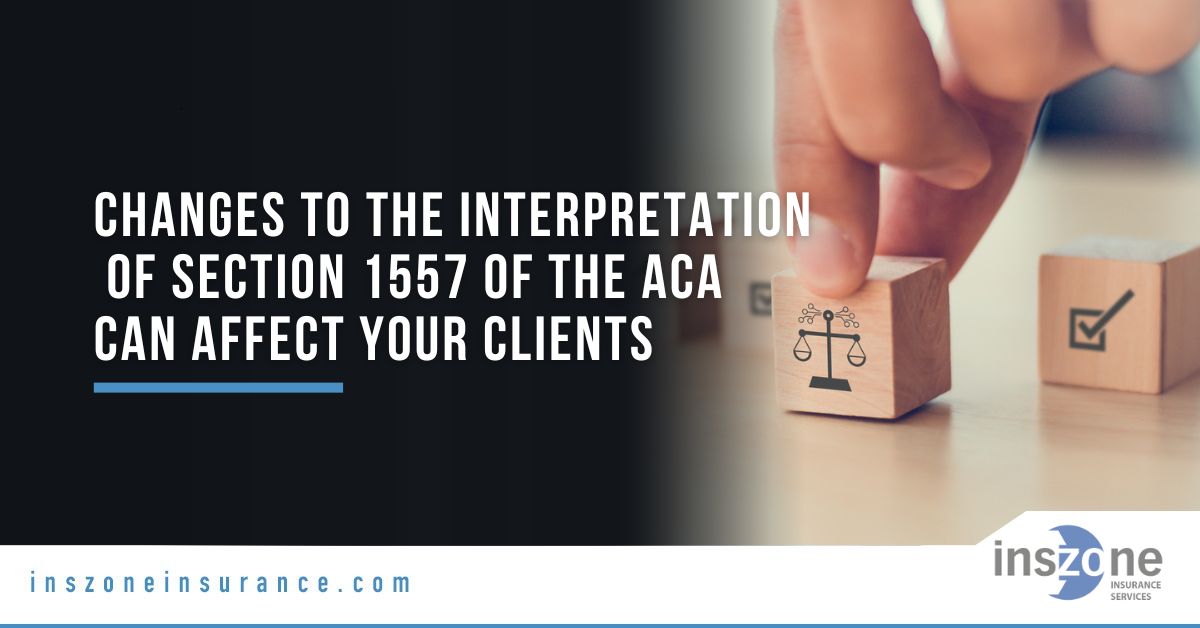Recent Changes to ACA Section 1557: Compliance Guide
The Affordable Care Act (ACA) continues to evolve, and understanding its nuances is essential to properly advising your clients. One of the most impactful sections of the ACA is Section 1557, often referred to as the nondiscrimination provision. Recent changes to the interpretation of this section can significantly impact businesses and healthcare providers, affecting compliance responsibilities and potential liabilities. Below, we break down these changes, explain what they mean for your clients, and offer strategies to help ensure compliance and minimize risks.
What Is Section 1557 of the ACA?
Section 1557 is the cornerstone civil-rights provision of the ACA. It prohibits discrimination based on race, color, national origin, sex, age, or disability in certain health programs and activities. Section 1557 broadly applies to any health program or activity receiving federal financial assistance, programs administered by federal agencies, and any entity established under Title I of the ACA, including the Health Insurance Marketplaces.
Initially, Section 1557 was enacted to provide broad protections ensuring equitable healthcare access for all individuals, emphasizing the rights of underserved and historically discriminated-against groups.
Recent Changes and Interpretations of Section 1557
The interpretation and application of Section 1557 have shifted in recent years, particularly concerning protections related to sex discrimination, gender identity, sexual orientation, and language assistance services.
Under the Obama administration, Section 1557 explicitly prohibited discrimination based on gender identity and sexual orientation. It also expanded language access requirements, ensuring that limited English proficient (LEP) individuals received appropriate translation services. However, subsequent administrations revised these interpretations, leading to ambiguity and ongoing legal challenges.
In 2020, a rule revision limited protections for gender identity and sexual orientation and narrowed the scope of entities required to provide language assistance. More recent federal court rulings and executive actions by the Biden administration have sought to restore broader protections, bringing Section 1557 interpretations closer to their original expansive intent. This has created a fluid regulatory environment with significant implications for businesses, insurers, and healthcare providers.
How Do These Changes Impact Your Clients?
Changes to Section 1557 directly affect health insurance carriers, healthcare providers, hospitals, clinics, and any business providing employee benefits. For your clients, these shifts mean potentially navigating new compliance standards and risks associated with discrimination claims.
Businesses and healthcare providers could face increased scrutiny from regulators, risk costly litigation, or experience reputational damage if non-compliant with the latest interpretations. Industries heavily reliant on federal funding or serving diverse populations must be especially aware of their obligations under the current regulatory environment.
Additionally, employers offering health benefits to employees may need to revise their policies, communication materials, and compliance training to align with the latest interpretations of Section 1557. For insurance carriers and healthcare providers, failing to adapt swiftly can lead to significant fines, penalties, or even suspension of federal financial assistance.
Compliance Strategies for Your Clients
As an insurance professional advising clients, your role includes helping them navigate this complex landscape effectively. Below are critical steps your clients should consider to ensure compliance:
- Policy Review and Updates: Encourage clients to review their nondiscrimination policies, ensuring they clearly prohibit discrimination based on gender identity, sexual orientation, disability, race, age, and national origin. Policies should reflect the latest federal guidelines and legal rulings.
- Training and Education: Suggest regular training sessions for employees and management teams about Section 1557. Training should cover anti-discrimination obligations and proper communication strategies, especially regarding gender identity, sexual orientation, disability accommodations, and language access.
- Language Assistance Services: Urge clients to assess their translation and interpretation services. LEP individuals must receive adequate support to understand and access healthcare services—robust language assistance programs mitigate compliance risks and enhance satisfaction.
- Documented Compliance Plans: Advise clients to create formal compliance programs that document policies, procedures, training, and corrective actions. Thorough documentation provides crucial evidence during audits or legal disputes.
- Legal and Expert Consultation: When regulations are complex and uncertain, partnering with legal experts and healthcare compliance specialists can significantly reduce risk. These specialists help businesses adapt quickly, maintaining compliance and competitiveness.
Proactive Risk Management Is Key
In an environment where regulations frequently shift, a proactive approach to compliance is crucial. Encouraging clients to review and update policies regularly, provide ongoing staff education, and leverage external expertise can significantly reduce the risks associated with changing interpretations of Section 1557.
Being proactive also provides a competitive advantage by positioning your clients as ethical, compliant, and socially responsible organizations dedicated to equitable healthcare access and nondiscriminatory practices.
Supporting You and Your Clients
At Inszone Insurance, we understand that keeping pace with regulatory changes can be daunting. Our goal is to help insurance professionals and businesses navigate these complexities effectively. By offering guidance, resources, and access to expert advice, we ensure that you and your clients can confidently maintain compliance with evolving interpretations of critical regulations like Section 1557.
If you have further questions or need assistance guiding your clients through these regulatory updates, contact Inszone Insurance today. Together, we can help your clients stay informed, compliant, and ready to navigate the ever-changing healthcare landscape.

